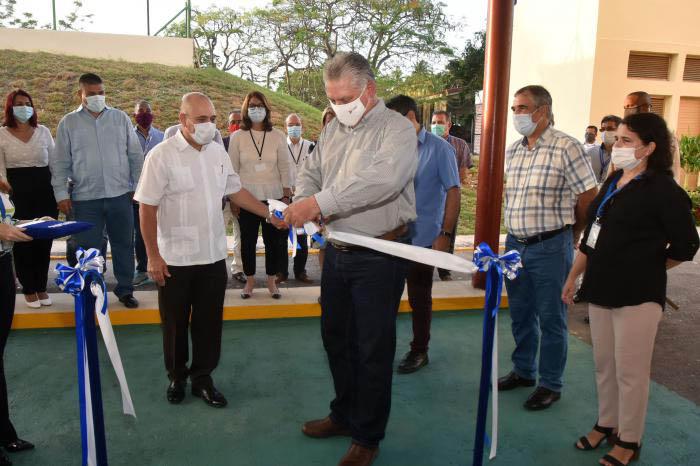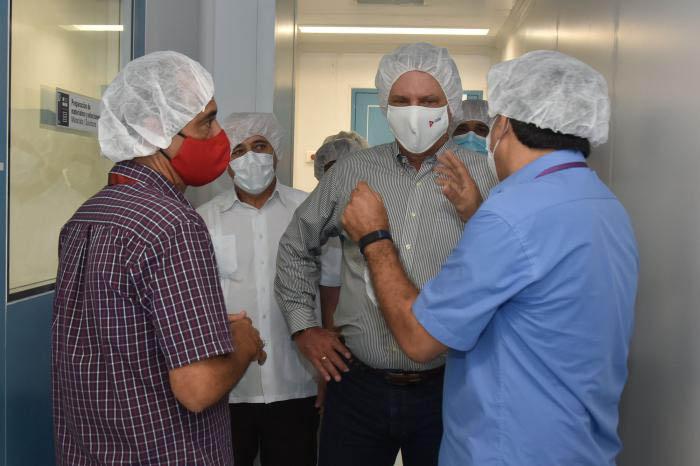
The President of the Republic, Miguel Díaz-Canel Bermúdez, July 30, inaugurated a synthetic peptide production plant at Cuba’s Center for Genetic Engineering and Biotechnology (CIGB), with which the country's ability to manufacture drugs through chemical synthesis technology at the industrial level is expanded.
Amidst of the current complexities Cuba is facing, the President noted this fact as an expression of the stability with which our public health system and the country are functioning, despite the effects of the COVID-19 pandemic and the aggression of our northern neighbor; evidence that, he said, "All this is possible when there is human capital, such as that which the Revolution has trained and is in these research centers."
We are witnessing the realization of a project that has been in the making for some time and that, despite these circumstances, did not come to a standstill, the President commented to the press, after touring the facility. This way of acting, he said, has much to do with Fidel’s brilliant idea of promoting and initiating, in the most difficult moments of the Special Period, the development of the Scientific Pole, which with the passing of the years was consolidated in the biotechnological and pharmaceutical industry group BioCubaFarma.
"This been maintained as a strength over time and been incorporated into the discipline, the work culture of the country, and in particular of this prestigious institution," he said. One of the scientific projects advancing, alongside the COVID-19 battle, is the culmination of this plant "that gives us sovereignty, makes it easier for us to reduce imports, and this is the path we are going to follow," he stated.

He insisted on the need to "continue developing research projects that bring us closer to national production of the active elements the Cuban biotechnology industry needs," so "we depend less and less on imports.”
He pointed out that, under current conditions of pandemic, effective purchases of these active prime components are very difficult - one of the causes that explains, the shortage of medicines that we have occasionally faced, since we cannot access certain markets.
Accompanied by Vice Prime Minister Roberto Morales Ojeda; BioCubaFarma's President, Eduardo Martínez Díaz; as well as CIGB managers and scientists, the President was able to appreciate the technological development and operation of the facility, by its 18 workers, most of them young.
As explained by President Oscar Cruz Gutiérrez, deputy director of Production at the Center for Genetic Engineering and Biotechnology, the plant will initially produce the drug Jusvinza, the trade name under which the well-known CIGB-258 has been registered, a vital drug in these times of COVID-19, and with satisfactory results in the treatment of patients who have developed complications, preventing more than 94% of the deaths of those in serious or critical condition.
Noting the impact that is expected from this new achievement of Cuban science, the director stated that this is a longstanding dream in Cuba, which gives the country a new productive system and the potential ability to help sister nations that request Jusvinza.
The facility now includes is now a safe production unit for the manufacture of molecules for pharmaceutical purposes, obtained by chemical synthesis in compliance with internationally recognized good practices. In addition to the production of the peptide that constitutes the active pharmaceutical ingredient of Jusvinza, it will be possible to further develop, for example, the medication CIGB-814, to treat rheumatoid arthritis, and CIGB-300, with anti-tumor effectiveness; while new manufacturing possibilities now exist for other potential medications based on synthetic peptides that could be used in oncological, cardiovascular, neuroregenerative, and some infectious diseases, including dengue fever.
Clearly, science in Cuba has much more to contribute to the country's development. This new peptide production plant, the fruit of human capital developed by the Revolution for more than sixty years, is also the pride of Cuban biotechnology and the nation.















